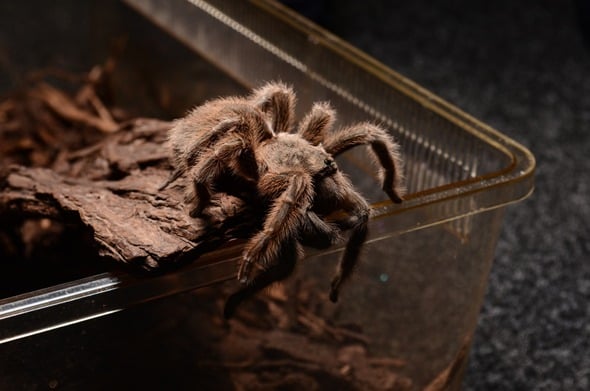Spooky and gruesome Halloween facts!

It’s the time of year when we associate spooky and gruesome animals with Halloween. We’ve got an array of facts about some of the animals here in our zoo which may creep you out…
Our Chilean rose tarantula deters predators by using the hairs which cover her body. These are flicked out from her abdomen and can cause irritation for hours or even days if they come into contact with skin. The spider’s venom is injected into its prey through the fangs, having differing effects dependent on the size of the victim.
Snakes are often thought as being slithery, slimy animals, although they do not produce or live in slime. They do, however, have backwards facing teeth. This is to ensure that when they strike their prey their teeth are hooked into them and the prey has less chance of successfully escaping. The snake would then open its mouth, stretch it around the prey and swallow it whole.
The popular image of meerkats is that they are often cute and friendly, but in the wild they can be very tactical and malicious animals. Their diet can sometimes consist of snakes and scorpions. Meerkats have become immune to some types of venom, therefore the risk of predating on these animals is greatly reduced. Despite this, they do still need to be wary of the snakes’ teeth and the scorpions’ pincers, and carefully teach their offspring about these dangers.
Like most animals, birds have tongues in their mouths, and our flock of flamingos are no different. However in Roman times the flamingo’s tongue was seen as a delicacy when pickled, therefore our flamingos should be very grateful that they are alive in the present day!
The majority of people know what ghosts and spirits are, but the Latin name for them is ‘lemur’. When humans first colonised on Madagascar they heard strange calls in the middle of the night, which turned out to be coming from the lemurs. They make a variety of calls to each other, which in the dark of the night could be quite terrifying!
One of the most dangerous animals we have in the park are our hippos. These animals are extremely territorial and have killed more people in Africa than crocodiles. Despite being herbivores, they will attack any human which enters its territory. The males will also compare canine tooth size, to gain a higher dominance status, which can grow to an impressive 72cm long!
Lindsay Taylor – Education Officer


